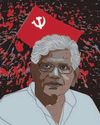
The day starts late in these villages. Breakfast is infrequent; lunch is deferred to about 4pm. Dinner is often had at mid-night. “We are at the crossroads of life and death,” says Mirjan Hasan, his voice hoarse. “Should we think of food at this juncture?”
For the past 15 months, about a dozen villages have been up in arms against a power grid project in the western part of Bhangar block, in West Bengal. These villages, in the South 24 Parganas district, are about 30km from Kolkata.
It all started in 2013, when the state government acquired 14 acres for the project (spread over four villages), under the Power Grid Corporation of India, to set up a 4,000kV power grid substation. The substation would transmit power to vast areas in the district, to the Sundarbans, and also to parts of Bihar.
Interestingly, the state government had acquired the land a day before Parliament passed the new land acquisition bill in 2013. The protesters have criticised Chief Minister Mamata Banerjee for using a “draconian” law—the Land Acquisition Act of 1894—to get the land. This is the same leader who had, for years, led a huge movement against land acquisition in Singur and Nandigram. That movement had helped her become chief minister.
Once work on the substation commenced, the villagers said they were not told about the project. They said they were bullied into giving up their land. “At the gunpoint of [Trinamool Congress leader] Arabul Islam and his men, the villagers were all forced to hand over their land to the government,” says Mosharaf Hossain, a villager. “He issued an ultimatum that if anybody did not give their land, they would be severely punished.”
Bu hikaye THE WEEK dergisinin May 20, 2018 sayısından alınmıştır.
Start your 7-day Magzter GOLD free trial to access thousands of curated premium stories, and 9,000+ magazines and newspapers.
Already a subscriber ? Giriş Yap
Bu hikaye THE WEEK dergisinin May 20, 2018 sayısından alınmıştır.
Start your 7-day Magzter GOLD free trial to access thousands of curated premium stories, and 9,000+ magazines and newspapers.
Already a subscriber? Giriş Yap

A golden girl
One of India's most formidable beauties passed away earlier this month. The odd thing is she would absolutely hate this obituary; she hated being written about and avoided publicity for all of her nine decades. Indira Aswani was 93 when she died. But anyone who encountered her, even briefly, was in such awe of her grace and poise, and one could not but remember her forever.

The interest in wine is growing delightfully in India
The renowned British wine writer and television presenter Jancis Robinson, 74, recently came to Delhi and Mumbai to reacquaint herself with India's wine industry. This was the Robinson's fourth visit to India; the last one was seven years ago. On this trip, Robinson and her husband, restaurateur Nicholas Lander, were hosted by the Taj Hotels and Sonal Holland, India's only Master of Wine.

United in the states
Indian-Americans coming together under the Democratic umbrella could get Harris over the line in key battlegrounds

COVER DRIVE
Usage-driven motor insurance policies offer several benefits

GDP as the only measure of progress is illogical
Dasho Karma Ura, one of the world's leading happiness experts, has guided Bhutan's unique gross national happiness (GNH) project. He uses empirical data to show that money cannot buy happiness in all circumstances, rather it is family and health that have the strongest positive effect on happiness. Excerpts from an interview:

India is not a controlling big brother
Prime Minister Tshering Tobgay considers India a benevolent elder sibling as the \"big brotherly attitude\" is happily missing from bilateral ties. He thinks the relationship shared by the two countries has become a model of friendship not just for the region, but for the entire world. \"India's attitude is definitely not of a big brother who is controlling and does not allow the little brother to blossom and grow,\" says Tobgay in an exclusive interview with THE WEEK.

Comrade with no foes
Lal Salaam, Comrade Yechury-you were quite a guy!

Pinning down saffron
In her first political bout, Vinesh Phogat rides on the anti-BJP sentiment across Haryana

MAKE IN MANIPUR
Home-made rockets and weapons from across the border are escalating the conflict

SAHEB LOSES STEAM
Coalition dynamics and poor electoral prospects continue to diminish Ajit Pawar's political stock